
The UNESCO-UNEVOC International Centre: Who We Are | What We Do | Working With Us | Get in Touch
The UNEVOC Network: Learn About the Network | UNEVOC Network Directory
For Members: UNEVOC Centre Dashboard
Thematic Areas: Inclusion and Youth | Digital Transformation | Private Sector Engagement | SDGs and Greening TVET
Our Key Programmes & Projects: BILT: Bridging Innovation and Learning in TVET | Building TVET resilience | TVET Leadership Programme | WYSD: World Youth Skills Day
Past Activities: COVID-19 response | i-hubs project | TVET Global Forums | Virtual Conferences | YEM Knowledge Portal
Our Services & Resources: Publications | TVET Forum | TVET Country Profiles | TVETipedia Glossary | Innovative and Promising Practices | Toolkits for TVET Providers | Entrepreneurial Learning Guide
Events: Major TVET Events | UNEVOC Network News

During coffee breaks and lunches, the Marketplace in the "Atrium" of the conference venue hosts a range of ideas and initiatives that contribute to transforming TVET systems, programmes, and activities. The segment features UNESCO projects and partners, aiming to facilitate small-group interaction and networking.
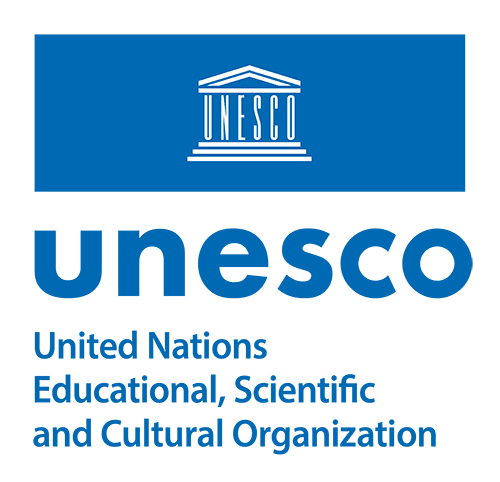 UNESCO
UNESCO
UNESCO connects education to the fast-evolving world of work through its promotion of skills for work and life. TVET helps youth and adults develop the abilities, knowledge, values and attitudes they need to find decent work and contribute to building a peaceful, healthy, just and sustainable world. TVET contributes to the targets of SDG4 to 'ensure inclusive and equitable quality education and promote lifelong learning opportunities for all’ and those of SDG8 for 'decent work and economic growth'. At UNESCO's Paris Headquarters, the Section of Youth, Literacy and Skills Development leads the work on TVET. This includes projects like the GSA Academy, the CapED programme, and the BEAR project.
UNESCO - Skills for work and life![]()
 Global Skills Academy
Global Skills Academy
The Global Skills Academy![]() (GSA) aims to support 10 million learners by 2029 to develop digital and core 21st-century skills to enhance their employability and resilience in a changing labor market. As of October 2022, the GSA has reached over 585,000 learners worldwide, mobilizing over 20 partners of UNESCO's Global Education Coalition. The Global Skills Academy Spotlight Session offers an interactive opportunity to learn more about the wide range of local and global learning solutions provided by GSA private sector partners and highlight the impact of the mission through the voice of learners and implementing centres. Online participants can learn more about GSA partners’ offer(s) on the virtual Marketplace on the conference platform (register here
(GSA) aims to support 10 million learners by 2029 to develop digital and core 21st-century skills to enhance their employability and resilience in a changing labor market. As of October 2022, the GSA has reached over 585,000 learners worldwide, mobilizing over 20 partners of UNESCO's Global Education Coalition. The Global Skills Academy Spotlight Session offers an interactive opportunity to learn more about the wide range of local and global learning solutions provided by GSA private sector partners and highlight the impact of the mission through the voice of learners and implementing centres. Online participants can learn more about GSA partners’ offer(s) on the virtual Marketplace on the conference platform (register here![]() ).
).
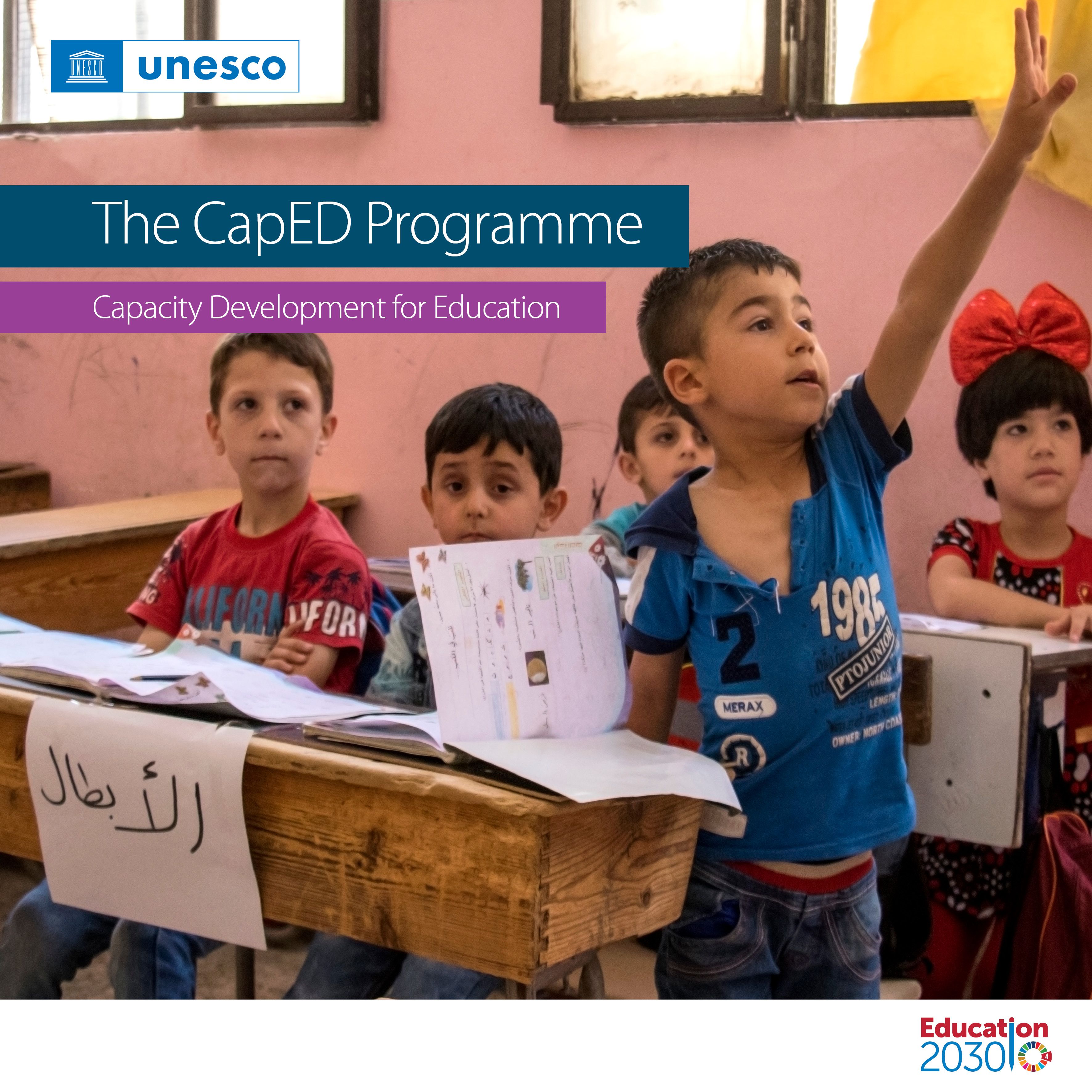 UNESCO's Capacity Development for Education (CapED) Programme
UNESCO's Capacity Development for Education (CapED) Programme
The CapED Programme is a key delivery platform for UNESCO in the framework of the Education 2030 agenda. It mobilizes UNESCO’s network of specialized Institutes and offices and works with partners to support least developed countries to design and implement education reforms that are essential to achieving national priorities and SDG4 commitments.
CapED’s work on TVET focuses on policy development for the creation of lifelong learning systems and effective delivery of educational programmes catering to disadvantaged groups, including girls and women helping them become financially independent.
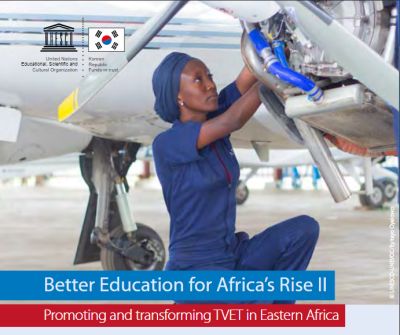 BEAR-II
BEAR-II
The Better Education for Africa's Rise II (BEAR II) project is an initiative of UNESCO with financial support from the Republic of Korea that was implemented from 2017 to 2022. The project has supported five East African countries: Ethiopia, Kenya, Madagascar, Uganda and the United Republic of Tanzania. BEAR II capitalized on the national and regional development plans and priorities of each participating country as well as on UNESCO's action in this field. It aims to improve and to transform national TVET systems by focusing on three key areas:
 UNESCO's International Centre for TVET, UNESCO-UNEVOC
UNESCO's International Centre for TVET, UNESCO-UNEVOC
From Bonn, UNESCO's designated centre for TVET, UNESCO-UNEVOC, supports Member States in their efforts to strengthen and upgrade their TVET systems. Through its innovative projects, capacity-building programmes and collaborative activities with more than 250 UNEVOC Centres around the globe, UNESCO-UNEVOC is working towards ensuring access to quality skills training and development for all.
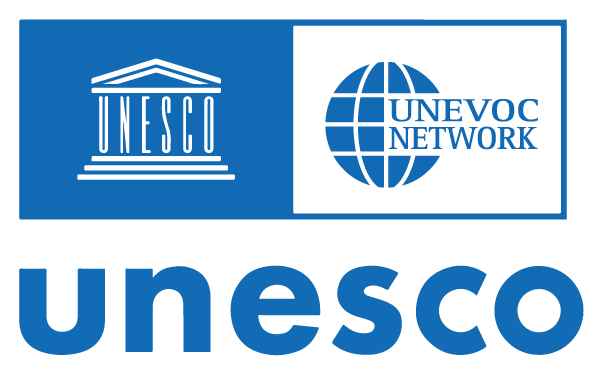 UNEVOC Network
UNEVOC Network
The UNEVOC Network is UNESCO’s global network for institutions specialized in TVET. It provides an environment for exchange, cooperation and mutual assistance for its members, the UNEVOC Centres. There are four types of UNEVOC Centres: ministries, national bodies, training providers and research institutions.
Through international collaboration and peer learning, UNEVOC Centres continue to enhance the quality of TVET teaching and learning opportunities offered in their respective countries.
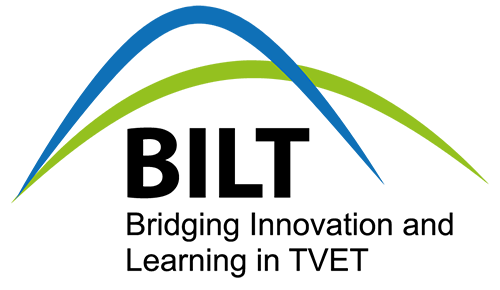 Bridging Innovation and Learning in TVET (BILT)
Bridging Innovation and Learning in TVET (BILT)
UNESCO-UNEVOC's Bridging Innovation and Learning in TVET (BILT) project aims to create a global knowledge bridge. This bridge supports TVET providers across Europe, Africa and Asia-Pacific to address current challenges in TVET systems arising from technological, social, environmental and workplace changes. The BILT project is implemented by UNESCO-UNEVOC with support of the Federal Institute for Vocational Education and Training (BIBB) and sponsored by Germany's Federal Ministry of Education and Research (BMBF).
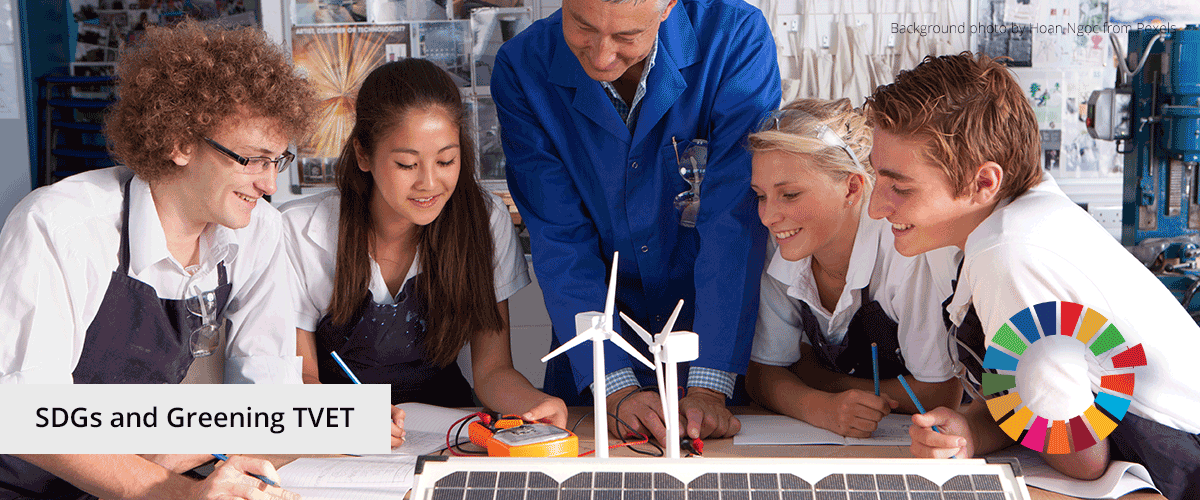 SDG Greening TVET
SDG Greening TVET
UNESCO-UNEVOC supports TVET institutions in the development and implementation of green strategies to transform their learning and training environments, in fulfilment of their role in skilling learners, upskilling professionals in green job sectors, and re-skilling those affected by job losses due to the transition. By mobilizing TVET Institutions to engage in advocacy and adopt greening TVET practices, UNESCO-UNEVOC helps enable leaders and educators to effectively develop institutional green and climate-responsive strategies that have a positive impact on society and the labour market.
UNESCO-UNEVOC SDG and Greening
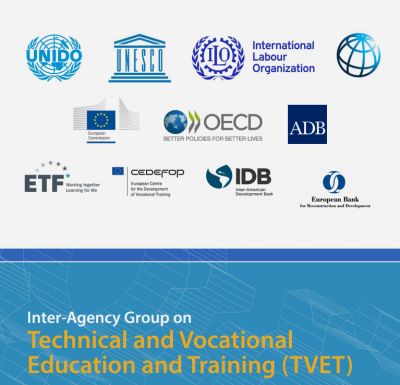 Interagency Group on Technical and Vocational Education and Training (IAG-TVET)
Interagency Group on Technical and Vocational Education and Training (IAG-TVET)
The IAG-TVET was convened by UNESCO in 2008 to ensure a good coordination of activities by the key international organisations involved in the delivery of policy advice, programmes and research on TVET. It enhances knowledge-sharing and a common understanding of key issues. Ultimately, the group seeks to better leverage the work of each member organisation to help countries design and implement more effective TVET policies to improve productivity, economic prosperity, sustainable development and employment opportunities.
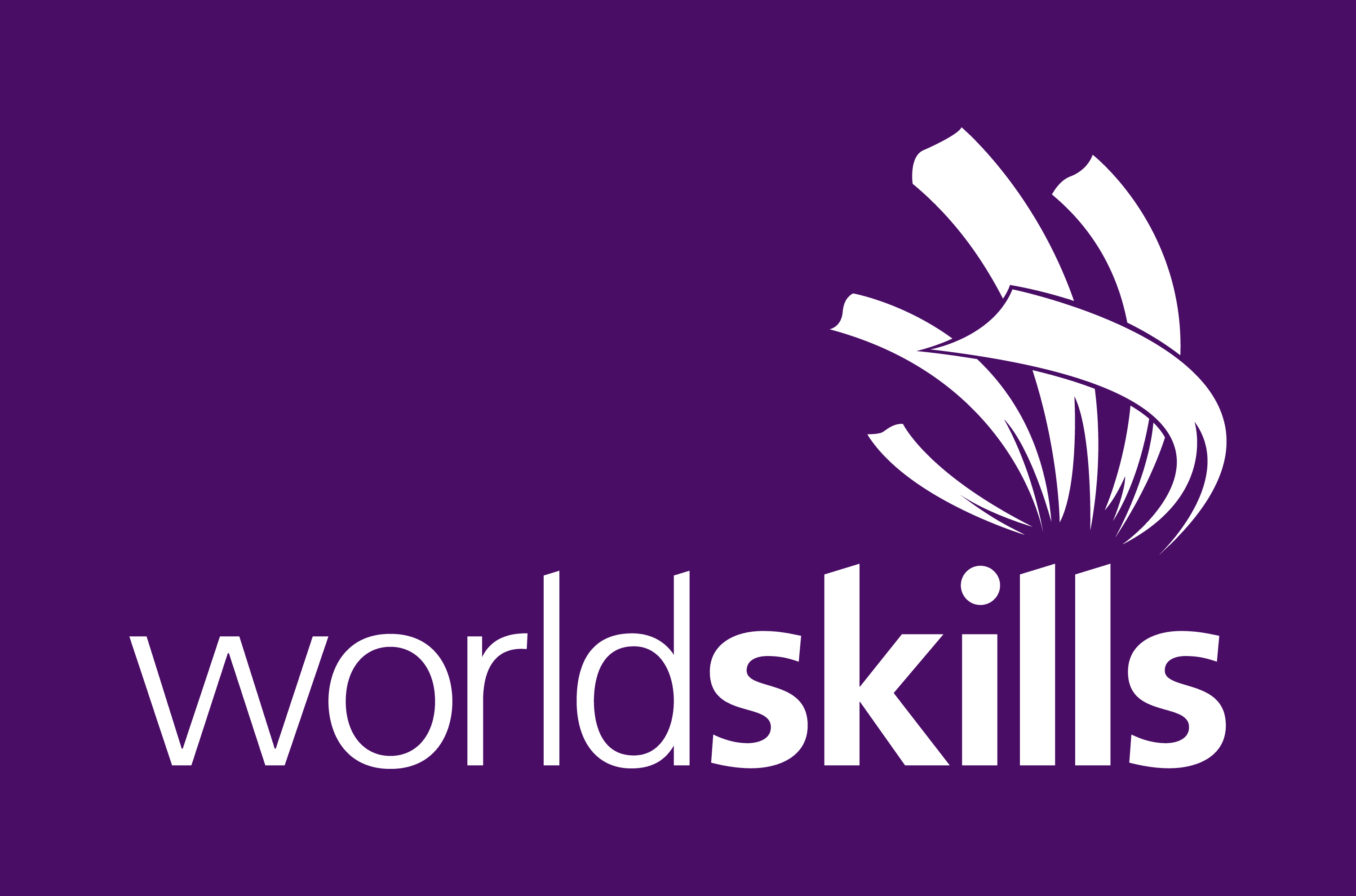 WorldSkills
WorldSkills
WorldSkills is a global movement that is changing the lives of young people through the power of skills. With 85 Members who are in charge of skills development and promotion in their respective countries, WorldSkills is working with partners and stakeholders to inspire young people to develop a passion for skills and pursue excellence through skills competition and promotion, develop global training standards to close the skills gap, and influence government, educators, and private sectors through research and international cooperation.
WorldSkills Champions Trust is a volunteer group of past Competitors who are the voice of young people in the WorldSkills movement. They work to raise levels of engagement among WorldSkills Champions and promote active involvement in WorldSkills projects, initiatives and activities.
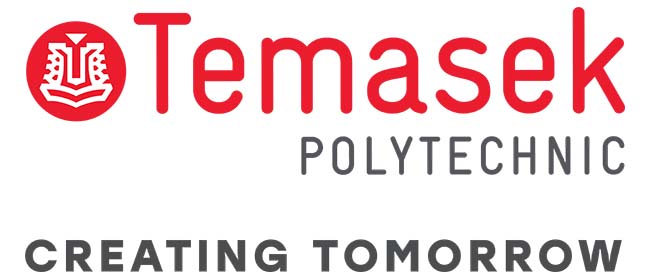 Temasek Polytechnic (TP)
Temasek Polytechnic (TP)
Temasek Polytechnic(TP) is one of the leading institutions of higher learning in Singapore. It offers over 76 diploma courses in applied science, business, design, engineering, humanities & social sciences and informatics & IT. TP students undergo a holistic learning system that combines hands-on experience, character education and relevant life skills.
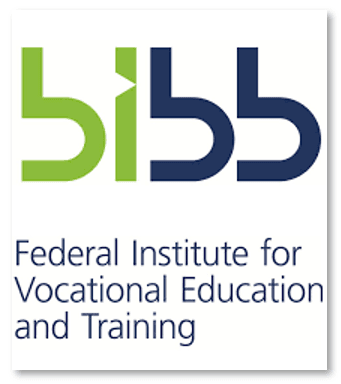 German Federal Institute for Vocational Education and Training (BIBB)
German Federal Institute for Vocational Education and Training (BIBB)
The German Federal Institute for Vocational Education and Training (BIBB) is recognized as a center of excellence for vocational research and for the progressive development of vocational education and training (VET) in Germany. BIBB works to identify future challenges in VET, stimulate innovation in national and international vocational systems, and develop new, practice-oriented solutions for both initial and continuing vocational education and training.
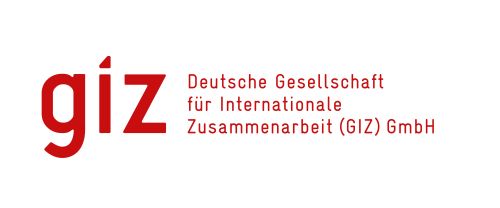 Deutsche Gesellschaft für Internationale Zusammenarbeit (GIZ)
Deutsche Gesellschaft für Internationale Zusammenarbeit (GIZ)
The Deutsche Gesellschaft für Internationale Zusammenarbeit (GIZ) GmbH is a global service provider in the field of international cooperation for sustainable development and international education work. As a public-benefit federal enterprise, GIZ supports the German Government – in particular the Federal Ministry for Economic Cooperation and Development (BMZ) – and many public and private sector clients in around 120 countries in achieving their objectives in international cooperation. With this aim, GIZ works together with its partners to develop effective solutions that offer people better prospects and sustainably improve their living conditions.
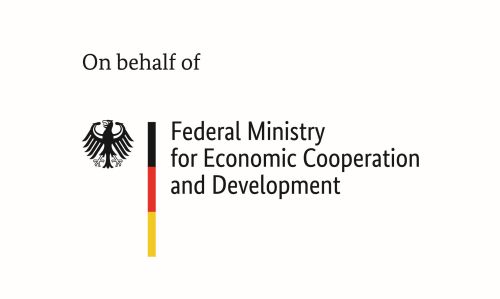 The GIZ Sector Project “Technical and Vocational Education and Training” (TVET)
The GIZ Sector Project “Technical and Vocational Education and Training” (TVET)![]() supports BMZ in developing TVET strategies and approaches for German and international development policy. A central task of the project is to provide comprehensive advisory services to the Ministry on TVET issues. The methods and activities adopted by the project focus on further developing BMZ’s existing strategies and approaches in the field of TVET and raising their profile, both in Germany and at international level.
supports BMZ in developing TVET strategies and approaches for German and international development policy. A central task of the project is to provide comprehensive advisory services to the Ministry on TVET issues. The methods and activities adopted by the project focus on further developing BMZ’s existing strategies and approaches in the field of TVET and raising their profile, both in Germany and at international level.
View on YouTube: TVET4Future![]() | TVET4Women
| TVET4Women![]()